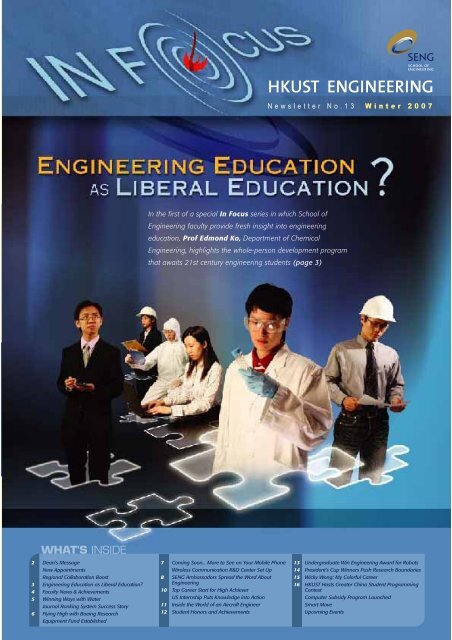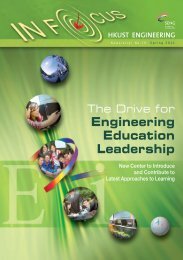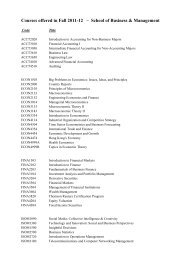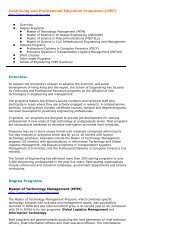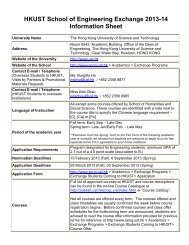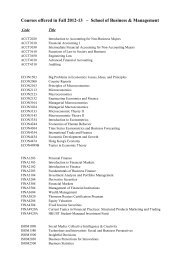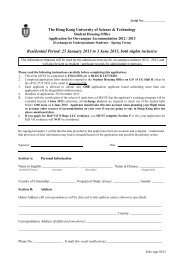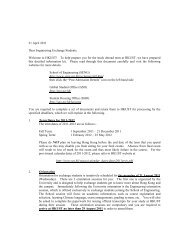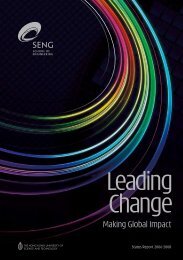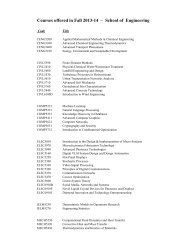WHAT'S INSIDE - seng, hkust
WHAT'S INSIDE - seng, hkust
WHAT'S INSIDE - seng, hkust
Create successful ePaper yourself
Turn your PDF publications into a flip-book with our unique Google optimized e-Paper software.
Newsletter No.13 Winter 2007<br />
In the first of a special In Focus series in which School of<br />
Engineering faculty provide fresh insight into engineering<br />
education, Prof Edmond Ko, Department of Chemical<br />
Engineering, highlights the whole-person development program<br />
that awaits 21st century engineering students (page 3)<br />
<strong>WHAT'S</strong> <strong>INSIDE</strong><br />
2 Dean's Message<br />
New Appointments<br />
Regional Collaboration Boost<br />
3 Engineering Education as Liberal Education<br />
4 Faculty News & Achievements<br />
5 Winning Ways with Water<br />
Journal Ranking System Success Story<br />
6 Flying High with Boeing Research<br />
Equipment Fund Established<br />
7 Coming Soon... More to See on Your Mobile Phone<br />
Wireless Communication R&D Center Set Up<br />
8 SENG Ambassadors Spread the Word About<br />
Engineering<br />
10 Top Career Start for High Achiever<br />
US Internship Puts Knowledge into Action<br />
11 Inside the World of an Aircraft Engineer<br />
12 Student Honors and Achievements<br />
13 Undergraduate Win Engineering Award for Robots<br />
14 President's Cup Winners Push Research Boundaries<br />
15 Wicky Wong: My Colorful Career<br />
16 HKUST Hosts Greater China Student Programming<br />
Contest<br />
Computer Subsidy Program Launched<br />
Smart Move<br />
Upcoming Events
Engineering Education as Liberal Education <br />
by Prof Edmond Ko<br />
Cover Story<br />
If the title of this article caught you by surprise, then your reaction<br />
was similar to mine when I, as an engineering student, came<br />
across a book entitled Engineering and the Liberal Arts by<br />
Samuel C Florman. What, I wondered then, could engineering and<br />
the liberal arts have in common<br />
To this day, many people still regard engineering as a dry, technical<br />
discipline that only involves the application of mathematics and<br />
science to solve real-world problems. In this light, engineering<br />
students are often perceived to be “nerdy” in the sense that they<br />
are too analytical, too narrowly focused, or lacking in people skills.<br />
In fact, since the beginning of the 20th century, there has been an<br />
emphasis on the non-technical component (often referred to as<br />
general or liberal education) of an engineering curriculum. This<br />
emphasis is even stronger in the 21st century, when engineering<br />
graduates now face more complex, multidisciplinary problems<br />
and, at the same time, a much wider choice of career paths. An<br />
engineering education thus provides a solid foundation for wholeperson<br />
development.<br />
As evidence, we can turn to the Accreditation Board for<br />
Engineering and Technology (ABET) in the United States, which<br />
recently adopted a new set of accreditation criteria called<br />
Engineering Criteria (EC) 2000. To receive accreditation, an<br />
engineering degree program must demonstrate that its graduates<br />
possess 11 capabilities, six of which are attributes generally<br />
associated with a liberal education:<br />
■ An ability to function on multidisciplinary teams<br />
■ An understanding of professional and ethical responsibility<br />
■ An ability to communicate effectively<br />
■ The broad education necessary to understand the impact of<br />
engineering solutions in a global/societal context<br />
■ Recognition of the need for, and an ability to, engage in<br />
lifelong learning<br />
■ Knowledge of contemporary issues.<br />
Engineering degree programs in Hong Kong are accredited by the<br />
Hong Kong Institution of Engineers (HKIE) which, as a member of<br />
the Washington Accord, holds engineering schools responsible for<br />
helping their students develop a series of attributes. Again, four of<br />
these attributes are usually related to liberal education. Students<br />
should be able to:<br />
■ Communicate effectively<br />
■ Engage in lifelong learning and professional development<br />
■ Act in accordance with the ethical principles of the<br />
engineering profession<br />
■ Function in contemporary society.<br />
It is thus clear from the above that an engineering education is<br />
aimed at developing people who not only are comfortable with<br />
quantitative methods and technology, but also possess the<br />
necessary knowledge and skills to solve complex, large-scale<br />
problems (technical or otherwise) that a modern society faces. As<br />
such, engineering education could indeed be viewed as the liberal<br />
education of the 21st century.<br />
Of course, we should be cautious in using labels such as<br />
“professional” or “liberal” in describing a discipline. The focus<br />
should not be on the label, but on clearly defining the intended<br />
learning outcomes of an engineering education in terms of the<br />
desirable graduate attributes, then delivering these outcomes in<br />
an effective and convincing manner. This is the approach taken by<br />
the School of Engineering in its planning for the new four-year<br />
undergraduate curriculum, details of<br />
which will be discussed in<br />
subsequent issues of In Focus.<br />
03
Faculty News & Achievements<br />
Prof Khaled Ben Letaief, Chair Professor and Head<br />
of Electronic and Computer Engineering, was<br />
recognized for his dynamic and imaginative service as<br />
founding editor-in-chief of IEEE Transactions on<br />
Wireless Communications 2002-2006 at the IEEE<br />
Communications Society Conference ICC 2007.<br />
Prof Chak Keung Chan, Chemical Engineering, has<br />
joined the editorial board of Atmospheric Chemistry<br />
and Physics, an interactive, open-access journal<br />
produced by the European Geosciences Union. In<br />
addition, Prof Chan's paper “Understanding<br />
Hygroscopic Growth and Phase Transformation of<br />
Aerosols Using Single Particle Raman Spectroscopy in<br />
an Electrodynamic Balance”, co-authored by Alex KY<br />
Lee and TY Ling, has been chosen as a “hot article” in<br />
scientific journal Faraday Discussions. An interview<br />
with Prof Chan on the paper is available at:<br />
http://www.rsc.org/Publishing/Journals/fd/News/Chan.asp<br />
Prof Guohua Chen, Chemical Engineering, has<br />
received “Most Cited Paper 2003-2006” awards for<br />
two co-authored papers published in Chemical<br />
Engineering Science. He has also been awarded a<br />
Certificate of Excellence by the World Forum for<br />
Crystallization, Filtration and Drying and a Certificate of<br />
Merit by the international journal Drying Technology<br />
for his outstanding research and development in the<br />
field. His paper “Electrochemical Technologies in<br />
Wastewater Treatment”, published in Separation and<br />
Purification Technology, July 2004, has remained one<br />
of the journal's top five “hottest articles” since its<br />
publication.<br />
The paper, “Factors in Liquid Crystal Photoalignment<br />
on Polymer Films: Photoorientation Versus Selfassembly”,<br />
written by Prof Vladimir Chigrinov and<br />
Prof Hoi Sing Kwok, Electronic and Computer<br />
Engineering, and published in Liquid Crystals, Volume<br />
33, Issue 2, was ranked among the journal's top 10<br />
most accessed articles in 2006. The paper was coauthored<br />
with O Yaroshchuk.<br />
Prof Kenny CS Kwok, Civil Engineering, has won the<br />
Best Paper Award at the Sixth China Urban Housing<br />
Conference Beijing. The paper “Air Ventilation<br />
Assessment for high density residential development”<br />
was co-authored by Raymond Leung and Owen LF<br />
Yue. A total of 260 papers were submitted.<br />
Prof Chung-Yee Lee, Chair Professor and Head of<br />
Industrial Engineering and Logistics Management, has<br />
been appointed Regional Vice-President Australasia<br />
for the Production and Operations Management<br />
Society (POMS). The society is the most authoritative<br />
source of developments in the production and<br />
operations management field.<br />
Prof Neville Lee, Industrial Engineering and Logistics<br />
Management, has been awarded a first-class China<br />
National Natural Science Award. Prof Lee was honored<br />
with the prestigious prize for his contribution to<br />
modeling, fabrication and characterizing of a poly<br />
crystal silicon thermal flexure actuator.<br />
Prof Yang Leng, Mechanical Engineering, has been<br />
made a Fellow of Biomaterials Science and<br />
Engineering. This honorary status recognizes Prof<br />
Leng's excellent professional standing and high<br />
achievements.<br />
Prof Mitchell M T<strong>seng</strong>, Industrial Engineering and<br />
Logistics Management, has been elected a Fellow of<br />
the American Society of Mechanical Engineers. The<br />
accolade recognizes Prof T<strong>seng</strong>'s achievements and<br />
exceptional contributions to the engineering<br />
profession.<br />
Prof Chi Ying Tsui and Prof Wing Hung Ki,<br />
Electronic and Computer Engineering, received the<br />
best paper award at the International Symposium on<br />
Low Power Electronics and Design (ISLPED). The<br />
paper, “Vibration Energy Scavenging and Management<br />
for Ultra Low Power Applications”, was co-authored by<br />
Chao Lu.<br />
Prof Tongyi Zhang, Mechanical Engineering, has<br />
won second prize in the State Natural Science Award<br />
2007. Prof Zhang's project was the only awardwinning<br />
project nominated by the HKSAR government<br />
this year.<br />
Prof Tianshou Zhao, Mechanical Engineering, has<br />
been elected a Fellow of the American Society of<br />
Mechanical Engineers. He has gained the honor for<br />
his outstanding research involving the development of<br />
clean and high-efficient energy technologies.<br />
04
Faculty News & Achievements<br />
Winning Ways with Water<br />
Prof Mohamed S Ghidaoui, Civil Engineering, has been<br />
drawing the attention of the media far and wide after<br />
gaining global recognition for his work in water<br />
engineering and environmental fluid mechanics by<br />
winning the 2007 Arthur Thomas Ippen Award from the<br />
International Association of Hydraulic Engineering and<br />
Research (IAHR). The award is the most important that<br />
the IAHR can bestow on a member of the water<br />
engineering and science community.<br />
Prof Ghidaoui received the award at the IAHR congress in<br />
Venice Italy in the first week of July 2007. He also delivered the<br />
Ippen lecture at the closing ceremony of the IAHR congress. The<br />
title of his talk was “Ippen's Analogy and the Development of<br />
Hydraulic Models using Boltzmann's Kinetic Theory of Gases”.<br />
The Ippen prize recognizes outstanding ability, originality and<br />
accomplishment in basic hydraulic research and applied<br />
hydraulic engineering. In its citation, the IAHR noted Prof<br />
Ghidaoui's outstanding contribution to hydraulics, water<br />
resources and environmental fluid mechanics, in particular, the<br />
modeling of surface, sub-surface and closed conduit flows.<br />
Applications include many of the world's greatest water issues,<br />
including water supply, quality,<br />
tsunamis, irrigation, land<br />
reclamation, navigation and<br />
drainage.<br />
The success of Prof Ghidaoui, born in Tunisia and<br />
only the second Asia-based researcher to be<br />
awarded the prize in its 30-year history, has put a<br />
spotlight on his academic research, HKUST and<br />
Hong Kong. Prof Ghidaoui has been interviewed on<br />
Tunisian radio, by Tunisian newspapers, and news of<br />
the award picked up by Hong Kong newspapers and<br />
other international media.<br />
During radio interviews, Prof Ghidaoui explained the<br />
field of hydraulics and shared his views on tsunami<br />
disasters, floods, desalination and its environmental<br />
consequences, and global warming, among other high-impact<br />
topics. In one interview, he was also joined by phone by two<br />
other Tunisian professors at HKUST School of Engineering-Prof<br />
Mounir Hamdi, Computer Science and Engineering, and Prof Ben<br />
Letaief, Chair Professor and Head of Electronic and Computer<br />
Engineering.<br />
“We were able to inform listeners about our research and all<br />
three spoke about the success of HKUST, the School of<br />
Engineering and its excellent ranking worldwide,” Prof Ghidaoui<br />
said. The radio interviews sparked strong interest among both<br />
listeners and Tunisian and overseas newspapers.<br />
Prof Ghidaoui received his BASc, MASc and PhD, all in Civil<br />
Engineering, from the University of Toronto, Canada and joined<br />
HKUST in 1993. His other awards include the Albert Berry<br />
Memorial Award from the American Water Works Association and<br />
Erskine Fellow Award, University of Canterbury, New Zealand.<br />
Journal Ranking System Success Story<br />
Industrial Engineering and Logistics Management Professor The paper documented joint work between HKUST and<br />
Andrew Lim and PhD students Hong Ma, Qi Wen, Zhou Xu business and technology consultants Red Jasper Limited on the<br />
and Zhu Wenbin won an Innovative Applications of Artificial successful deployment of an online interactive journal ranking<br />
Intelligence (IAAI) Deployed Application Award for their paper, system. The new system allows users to interactively configure<br />
“Journal-Ranking.com: An Online Interactive Journal Ranking their ranking interests, as well as provide a more reasonable<br />
System”, at this year's IAAI annual conference. The international method to evaluate a journal's impact.<br />
event, sponsored by the Association for the Advancement of<br />
Artificial Intelligence was held in Vancouver, Canada.<br />
05
Research & Industry Collaborations<br />
Flying High with Boeing Research<br />
In a significant move, HKUST has entered into<br />
collaborative agreements with leading US aviation<br />
innovator Boeing Phantom Works, together with Tsinghua<br />
University in Beijing and Southeast University in Nanjing,<br />
to research and develop new technology associated with<br />
wireless communications.<br />
Phantom Works is the advanced research and<br />
development unit for US aviation giant Boeing and the<br />
driver of innovation at the enterprise. The research,<br />
intended to enable breakthroughs that will benefit<br />
onboard entertainment systems for Boeing's commercial<br />
airplanes and communication among maintenance<br />
technicians at airports, will be carried out by professors,<br />
doctoral and master's degree candidates at the three<br />
universities.<br />
At HKUST, faculty and students in the Computer Science<br />
and Engineering Department will work on the problem of<br />
seamless connectivity among different networks used by<br />
aircraft line maintenance technicians at airports. Hong<br />
Kong International Airport will also participate in the<br />
project.<br />
Tsinghua University research will focus on ways to<br />
improve the quality of wireless video streaming for<br />
onboard entertainment systems and how to make better<br />
use of the already installed physical wiring for onboard<br />
entertainment systems. At Southeast University, studies<br />
will be conducted on compact, ultra-wideband antennas<br />
for onboard entertainment systems that do not cause<br />
interference with other systems on the airplane.<br />
Mr Robb Graham of Phantom Works' Engineering and<br />
Information Technology organization, said: “We believe<br />
the talented staff and students at these universities can<br />
help us address key technology development challenges<br />
and complement our own research.”<br />
Mr David Wang, President of Boeing China, said: “China<br />
and Boeing have a long, successful history of working<br />
together. The collaborative agreements with Tsinghua<br />
University, Southeast University and HKUST further<br />
expand our relationships and recognize the world-class<br />
capabilities of Chinese academic institutions.”<br />
Equipment Fund Established<br />
Chiaphua Industries Limited has pledged HK$2 million<br />
to establish a research equipment fund for the<br />
Department of Chemical Engineering. The donation<br />
will be earmarked to purchase new equipment or<br />
upgrade equipment, and to help the Department to<br />
devise long-term plans for the acquisition of<br />
equipment, among other uses.<br />
The Department's research focus centers on areas at the<br />
cutting edge of new knowledge in chemical engineering,<br />
including advanced materials, biotechnology, high valueadded<br />
products, process engineering and environmental<br />
technologies. Prof Chi Ming Chan, Chair Professor of<br />
Chemical Engineering and Director of the Optical Fiber<br />
Lighting Cables Cooperative Research Center, said: “The<br />
Chiaphua donation will provide wonderful support for<br />
our leading research by enabling the Department to look<br />
ahead and purchase the best possible equipment for<br />
overall development.”<br />
06
Research & Industry Collaborations<br />
Coming Soon... More to See on Your Mobile Phone<br />
A breakthrough technology has been developed by a<br />
Department of Electronic and Computer Engineering<br />
academic that will allow mobile phone users to turn their<br />
handsets into a wide-ranging media center.<br />
The exciting innovation, known as “Pan-V”, enables<br />
mobile phone users to substantially expand the<br />
video/audio contents available on their handsets,<br />
according to Professor Oscar Au, Electronic and Computer<br />
Engineering, who has helped to create the technology<br />
together with Hong Kong company AnTech MPS (Global)<br />
Ltd.<br />
The research project was funded by the Hong Kong<br />
Innovation and Technology Commission, with the<br />
technology licensed to AnTech. “In a great display of<br />
university, industry and government co-operation, we<br />
have developed a novel technology that can revolutionize<br />
the behavior of mobile users throughout the world,<br />
bringing about better life and greater convenience,” Prof<br />
Au said.<br />
Pan-V will enable users of 3G and 3.5G mobile phones to<br />
watch television programs at almost the time that shows<br />
are aired, see DVDs, and watch surveillance videos,<br />
among other video/audio contents.<br />
Housed in a modem-sized box, the technology is<br />
designed to connect to a television, audio-visual<br />
equipment or surveillance camera. It can then capture,<br />
store and stream video and audio content, compressing<br />
them into a format that can be accessed on mobile<br />
phones, other mobile devices such as PDAs and<br />
notebooks, and also computers.<br />
Prof Au said that a delay of less than 20 seconds would<br />
allow the system to capture the video feed. He pointed<br />
out that Pan-V would allow any mobile phone with access<br />
to the internet to enjoy real-time television, including<br />
handsets costing less than HK$2,000.<br />
Pan-V complies with international standards of data<br />
computing and communications and can be used<br />
anywhere in the world. It can also be operated remotely,<br />
allowing users to change channels, start and stop a<br />
recording, and switch video input, among other functions.<br />
Wireless Communication R&D Center Set Up<br />
HKUST and Huawei Technologies Co Ltd, a leader in<br />
next-generation telecommunications networks, have<br />
established the Huawei-HKUST Joint Research and<br />
Development Center. The research center aims to<br />
support the University's pursuit of academic excellence<br />
in wireless communication technology, to further<br />
industrial collaboration, and to provide training to<br />
leaders of the next generation. The center will also<br />
support Huawei's product development and enhance<br />
its research and development capability. Professor<br />
Khaled Ben Letaief, Chair Professor and Head of the<br />
Electronic and Computer Engineering Department, said<br />
he was delighted about the development.<br />
07
Beyond Labs & Lectures<br />
SENG Ambassadors Spread the Word About Engineering<br />
Computer Science and Engineering. This year, a total of 29<br />
students have been nominated to participate from the School's<br />
six departments and the Computer Engineering program.<br />
Third-year<br />
undergraduate Liew<br />
Seng Fatt, Electronic and Computer<br />
Engineering, is still working toward his degree. Yet, as a<br />
School of Engineering (SENG) Student Ambassador, there are<br />
already many mysteries about the engineering world that he can<br />
unlock for secondary students who may want to follow him.<br />
“Often, school students are unaware of what engineering is all<br />
about,” said Seng Fatt, one of a group of Year 3 ambassadors<br />
from different SENG departments who spoke to In Focus. “They<br />
think engineers do experiments, play with gadgets, but don't<br />
really know about the different areas within the field or the<br />
prospects.”<br />
Engineering and the extensive range of disciplines and careers it<br />
covers, its essential role in the modern world and the benefits<br />
that society derives from those who join the multi-faceted<br />
profession are just some of the eye-opening areas that the SENG<br />
Student Ambassador Program is keen to bring to the attention of<br />
secondary students as they consider what direction to take at<br />
university and beyond, and to students' families.<br />
The program was set up in 2006 to widen interest among and<br />
inform young people about different HKUST engineering<br />
degrees and the careers that follow at a peer-to-peer level. “They<br />
treat us as brothers and sisters,” said Claudia Sin Hiu-ching,<br />
Ambassadors attend training workshops to strengthen their<br />
knowledge of HKUST and business etiquette then participate in<br />
SENG outreach events, such as school visits and open days.<br />
School visits may involve setting up a booth at a school and<br />
giving a demonstration that illustrates what the ambassador's<br />
particular department does, explaining basic engineering<br />
concepts, and answering questions about student life at HKUST.<br />
Open days may find ambassadors showing visitors their<br />
department's laboratories, equipment, and HKUST's scenic<br />
campus.<br />
Through such events, the ambassadors also have the opportunity<br />
to meet a range of people inside and outside HKUST and<br />
develop their time management, presentation and interpersonal<br />
skills. Secondary school students, teachers and parents can gain<br />
both an informed and an informal view of life as a HKUST<br />
engineering undergraduate.<br />
“I think what we are doing is very useful,” said Reeves Chung<br />
Ming-yan, Civil Engineering. “When I was a secondary school<br />
student, I didn't know the difference between architecture and<br />
civil engineering. This type of thing can be very confusing when<br />
you are still at school. As a student ambassador, I have the<br />
opportunity to explain, talk about the School of Engineering and,<br />
hopefully, help others to find a good path.”<br />
Aviva Chow Shing-fung, Chemical Engineering, further explained:<br />
“Most secondary students think engineering students are quite<br />
08
oring and not willing to talk to each other. I wanted<br />
to break this traditional view. So I became a student<br />
ambassador.”<br />
With HKUST hosting the only chemical engineering department<br />
in Hong Kong, Aviva is also keen to explain more about his<br />
subject. “Chemical engineering is a discipline in which the<br />
principles of mathematical, physical and natural sciences are<br />
used to solve problems in applied chemistry. Through the work<br />
of chemical engineers, new petroleum products, plastics,<br />
agricultural chemicals, pharmaceuticals, electronic and advanced<br />
materials, among many other products, evolve.”<br />
Helping secondary school students to understand the<br />
essential role of engineering in the community and the<br />
positive job prospects in the field is vital for Hong Kong<br />
given the strong emphasis on business in the city, the student<br />
ambassadors said.<br />
“Take the stock market for example,” said Anthony Lee Laptak,<br />
Technology & Management Dual Degree Program -<br />
Computer Engineering and General Business Management.<br />
“Behind the screens showing the price of the stocks, many<br />
programs are required to get the prices and operate the trading<br />
system. This all has to be done by programmers with<br />
professional training.<br />
“Infrastructure projects need civil engineers. Logistics and<br />
industry need professional engineers. Hong Kong needs<br />
engineers,” he said.<br />
As does the world at large.<br />
09
Students<br />
Top Career Start for High Achiever<br />
Fresh graduate Ray Fang, Computer Engineering (CPEG),<br />
set a new high for CPEG graduate employment earlier in<br />
the year when the then final-year student secured a top<br />
job opportunity from a New York-based hedge fund<br />
management company. Ray defeated many of his Englishnative<br />
counterparts in two rounds of interviews to win a<br />
junior application developer position with a salary of<br />
nearly HK$50,000 per month.<br />
In fact the appointment is a return for the outstanding<br />
achiever, who worked at the company as an intern during<br />
the summer of 2005 after finishing his exchange studies<br />
at the School of Engineering & Applied Science, University<br />
of Pennsylvania, US.<br />
Ray, originally from Mainland China, was admitted to<br />
HKUST's Computer Engineering Program in 2003. A<br />
passionate learner, he gained a number of scholarships<br />
and Dean's List Awards. He said he felt CPEG had been<br />
the perfect choice for him as it provided exposure to a<br />
wide range of hardware and software issues. He also<br />
finds it great fun and highly satisfying to apply what he<br />
has learnt during the CPEG program to the realities of the<br />
commercial world.<br />
US Internship Puts Knowledge into Action<br />
Technology & Management (T&M) Dual Degree Program<br />
student Mary Lau was able to put both her mechanical<br />
engineering skills and general business management<br />
knowledge to work over the summer with a high-flying<br />
internship at Beckman Coulter, Inc in Minnesota, US.<br />
Beckman Coulter is a leading manufacturer of biomedical<br />
testing instrument systems, tests and supplies. During her<br />
time at the company, Mary was able to work on product<br />
design and help to develop automated machines to carry<br />
out medical tests for clinical and diagnostic applications.<br />
“I found my T&M studies assisted me a<br />
great deal,” said Mary,<br />
now in her final year at<br />
HKUST. “I had to design<br />
hardware and perform<br />
experiments to conceptprove<br />
potential<br />
improvement for nextgeneration<br />
biomedical<br />
instruments. I also applied<br />
the business knowledge I had learnt to my product design,<br />
which had to take into consideration the needs of the<br />
market and clients' business strategies. I really enjoyed the<br />
relaxed working environment, which cultivates employees'<br />
innovation, and was happy to receive very good feedback<br />
from the company.”<br />
Mary took up her US summer internship immediately after<br />
her exchange to the University of Minnesota.<br />
10
Students<br />
Inside the World of an Aircraft Engineer<br />
Chan Chi Ho, Year 3 Mechanical Engineering, shares<br />
his exhilarating experience as a member of the<br />
student Aircraft Engineer Development Scheme,<br />
organized by the Hong Kong Institution of Engineers<br />
(HKIE) and Hong Kong Aircraft Engineering<br />
Company Ltd (HAECO)<br />
I joined the Aircraft Engineer Development Scheme shortly<br />
before the start of the Spring semester in my second year. This<br />
was the first time the program had been offered and I was<br />
proud to be among those selected.<br />
The scheme is recognized by the Civil Aviation Department<br />
(CAD) so that the material we learn, the exams we take and<br />
the training hours accumulated during the two-year program<br />
will be recognized if we apply for the HKAR-66 Category B<br />
Aircraft Maintenance License from CAD in the future.<br />
The scheme has various components. Firstly, participants are<br />
divided into groups and mentors assigned to each group. We<br />
have meetings regularly to discuss our progress and recent<br />
aviation issues. Guidance courses and site visits are also<br />
organized to equip us with aviation knowledge. To date, I have<br />
visited the HAECO and Government Flying Service hangars at<br />
Chek Lap Kok, and the headquarters of Hong Kong Aero<br />
Engine Services, a company that specializes in overhauling<br />
Rolls-Royce engines in Tseung Kwan O. I was even offered the<br />
chance to visit the Asian Aerospace show held in Hong Kong in<br />
early September.<br />
However, my most unforgettable experience so far has been<br />
the two-week, on-the-job training at HAECO headquarters at<br />
Chek Lap Kok in mid-August. In the first week, classroom<br />
lectures helped us to learn the basics of the industry, such as<br />
the maintenance procedures for different types of aircrafts and<br />
safety precautions in the hangar. After acquiring sufficient<br />
knowledge to work in the hangar, we were led by a licensed<br />
aircraft engineer to observe different maintenance tasks on a<br />
genuine aircraft.<br />
Since inspections are carried out on every part of the aircraft,<br />
we were able to access different parts of the aircraft, including<br />
those out of bounds to pas<strong>seng</strong>ers and even crew members.<br />
For example, we observed the installation of special batteries<br />
in the avionics compartment right below the cockpit and an<br />
inspection of the flight recorder installed in a small<br />
compartment behind the main cabin. Furthermore, we learnt<br />
the importance of teamwork and got an idea of how the work<br />
was organized among team members.<br />
We could talk to the engineers and technicians working there<br />
in order to understand more about the working environment<br />
and the opportunities in the industry. But most exciting of all<br />
was the fact that aircraft were taking off and landing just beside<br />
me every day for two weeks. That was awesome!.<br />
11
Students<br />
Honors and Achievements<br />
An Industrial Engineering and Logistics Management<br />
team beat nine other teams from local universities to<br />
win the 2007 Hong Kong Society for Quality Company<br />
Based Student Project Competition.<br />
Cheung Cheuk-him and Chung Chun-tak, Computer<br />
Science and Engineering, won the first runner-up and<br />
bronze award in the Hong Kong region and final round<br />
of the 2007 Amway Pan-Pearl River Delta Region<br />
Universities IT Project Competition with their final year<br />
project “Feng Shui Design and Analysis System”.<br />
First-year student Brian Cheung Ngai-hoi, Technology<br />
& Management Dual Degree Program, gained<br />
sponsorship to participate in the Summer Institute in<br />
Business and Technology offered by the renowned<br />
University of Pennsylvania.<br />
PhD candidate Liwei Guo, Electronic and Computer<br />
Engineering, received the 2007 IEEE International<br />
Workshop on Signal Processing Systems (SiPS) Best<br />
Paper Award. His paper, “Fast Multi-hypothesis Motion<br />
Compensated Filter for Video Denoising”, was coauthored<br />
by Professor Oscar Au and postgraduate<br />
students Mengyao Ma and Zhiqin Liang.<br />
Doctoral candidate Yiu-ting Lau, Chemical Engineering,<br />
won the 16th International Conference on Secondary<br />
Ion Mass Spectrometry Student Award, held in<br />
Kanazawa for his paper “Lamellar Orientation on the<br />
Surface of a Polymer Determined by ToF-SIMS and<br />
AFM”.<br />
Fresh graduate Kino Lin Jialiu, Computer Engineering,<br />
received a full scholarship to study Computer Science<br />
at Carnegie Mellon University in the US. The<br />
scholarship will cover six years' study for a PhD degree.<br />
PhD student Ernest Lo Sze-yuen, Electronic and<br />
Computer Engineering, won the Best Paper Award at<br />
the prestigious 2007 IEEE International Conference on<br />
Communications, held in Glasgow, Scotland. The<br />
award-winning paper, “Cooperative Concatenated<br />
Coding for Wireless Systems”, was co-authored by<br />
Professor Khaled Ben Letaief, Chair Professor and Head<br />
of Electronic and Computer Engineering.<br />
Doctoral candidate Shen Dou, Computer Science and<br />
Engineering, won first prize at the Postgraduate Student<br />
Research Paper Competition, organized by the IEEE<br />
(HK) Computational Intelligence Chapter. His research<br />
paper focused on “Building Bridges for Web Query<br />
Classification”.<br />
Several Civil Engineering students received awards at<br />
this year's Institution of Civil Engineers (ICE) Hong<br />
Kong Association paper competition. Suen Po-chi, and<br />
Tsoi Hiu-fung received the Best Paper Award and Merit<br />
Award respectively in the Structural and Materials<br />
Discipline. Tsang Chun Wang received the Best Paper<br />
Award in the Highways, Railways and Transportation<br />
Discipline.<br />
Third-year student Sunny Wong Kai-kwong,<br />
Technology & Management Dual Degree Program, was<br />
awarded the Epson Foundation Scholarship 2006-07.<br />
The scholarship aims to reward university students with<br />
outstanding academic performance and sound social<br />
responsibility.<br />
PhD graduate Zhou Xu, Industrial Engineering and<br />
Logistics Management, gained an honorable mention<br />
for his thesis in the prestigious Transportation Science<br />
and Logistics (TSL) Society Best Dissertation Prize<br />
Competition 2007.<br />
Final-year undergraduate Kevin Zhao Keliang,<br />
Computer Science and Engineering, received full<br />
scholarships to Carnegie Mellon University and<br />
University of California, San Diego in the US for PhD<br />
studies.<br />
PhD student Zhu Xiuling, Electronic and Computer<br />
Engineering, won the Best Poster Award at Asia Display<br />
2007 in Shanghai for his paper “High-performance Topemitting<br />
White Organic Light-emitting Devices”.<br />
12
Students<br />
Undergraduates Win<br />
Engineering Award for<br />
A School of Engineering student team has reinforced the<br />
enterprising outlook of a SENG education by taking home the<br />
“Best Engineering Award” at the 2007 Robocon Hong Kong<br />
contest.<br />
The annual competition, organized by RTHK, the Hong<br />
Kong Institution of Engineers and Hong Kong Computer<br />
Society, encourages university students to gain first-hand<br />
experience of engineering and information technology<br />
applications by creating their own robots. The robots must<br />
then undertake a series of tasks in a competition against<br />
machines created by other student teams.<br />
The “Fiery Dragon” team, comprising 13 students from the<br />
Departments of Electronic and Computer Engineering and<br />
Mechanical Engineering and the Computer Engineering<br />
Program, also picked up the second runner-up prize and<br />
gained the highest score of all matches in the final.<br />
The 2007 Robocon Hong Kong contest was the fourth time<br />
the competition had been organized locally, attracting a total of<br />
nine student teams from five different local universities. Another<br />
SENG team, “Delta”, also took part. The overall winner was a<br />
University of Hong Kong team which went on to represent Hong<br />
Kong at the 6th ABU Asia-Pacific Robocon contest in Hanoi. A<br />
HKUST team won Robocon Hong Kong in 2005.<br />
Notable technical features of both HKUST teams' robots included a<br />
superior route recognition system enabling them to move faster<br />
than other rival robots, mechanical arms that could swiftly and<br />
comfortably transport objects, and an obstacle detection device,<br />
which emitted sound waves and calculated the distance of an<br />
obstacle from the rebound, allowing the robots to avoid collisions.<br />
Both teams' automatic machines also had color sensor capabilities,<br />
allowing them to recognize opponents' “pearls” (the objects being<br />
transported) and prevent them from scoring.<br />
In addition, getting ready for the contest helped strengthen<br />
students' information-gathering skills while taking part gave them<br />
the opportunity to meet up with and see the work of their peers at<br />
other institutions. Fiery Dragon team member Frank Shen,<br />
Electronic and Computer Engineering, said that preparing for and<br />
participating in the event had helped to expand his knowledge and<br />
views. “The Robocon experience not only greatly broadened my<br />
perspective but also helped me to do well in class,” he said.<br />
13
Students<br />
President's Cup Winners Push Research Boundaries<br />
Original, creative and socially aware student teams and<br />
individuals from the School of Engineering swept up all the top<br />
awards in the President's Cup 2007, an annual University-wide<br />
contest organized by HKUST to encourage undergraduates to<br />
pursue research, innovate, and enhance their presentation<br />
skills.<br />
The two main prizes in this year's President's Cup went to<br />
teams from the Department of Chemical Engineering. The<br />
overall winners were Cheung Chi-yeung, Cheung Tsz-wing,<br />
Chung Yiu-lun and Hau Yu-ki, who greatly impressed the<br />
Selection Committee with their enterprising project focused on<br />
the “Production of Particles for Pulmonary Drug Delivery Via<br />
Aerosol Technology”. The project sought to create a platform<br />
to investigate the feasibility of manipulating piezoelectric ink<br />
jet printing technology to produce mono-disperse droplets for<br />
pulmonary drug delivery.<br />
Entries for the contest are initially assessed by the Selection<br />
Committee on their objective, originality, and innovativeness,<br />
among other aspects. The Selection Committee, which is<br />
constituted by the Office of the Vice-President of Academic<br />
Affairs, then draws up a shortlist of those to go forward to the<br />
semi-final. For the semi-final, entrants must provide a final<br />
report and participate in an exhibition which is open to the<br />
public. The exhibition may involve on-site demonstration of a<br />
new invention or a display of project deliverables. In a further<br />
test of students' communication skills, those chosen to go on<br />
to the final must prepare a 15-minute oral presentation, which<br />
is followed by questions from the Selection Committee. These<br />
presentations are also open to the public.<br />
Fellow Chemical Engineering students Chan Wai-kit, Cheung<br />
Ki, Koon Wing-tsz and Siu Fong-chung took the Gold Award for<br />
their work on “A Novel Catalytic System for the Removal of<br />
Pollutants Emitted from Motor Vehicles”. With the Hong Kong<br />
government seeking to reduce levels of pollutant emissions,<br />
the students set out to develop a new type of catalytic<br />
converter that uses copper supported on bentonite (the<br />
component in a conventional converter is platinum) and to<br />
simultaneously reduce nitrogen oxides over 80% and volatile<br />
organic compounds through selective catalytic reduction.<br />
There were two Silver Award winners. Kelly Woo Ka-po, Civil<br />
Engineering, gained one for her project “Evolutionary Structural<br />
Form Optimization for Improving Economical Effectiveness of<br />
High-rise Buildings Using Hybrid Genetic Algorithms”, which<br />
investigated how to develop an efficient and effective way to<br />
perform sizing optimization and topological optimization<br />
simultaneously. An Electronic and Computer<br />
Engineering team comprising Lance Lam Chi-wai,<br />
Chau Chun-mei and Tam Ka-yan took the other<br />
award with “Application of Real Time Searching<br />
Algorithm in Image Encoder”.<br />
14
Alumni<br />
Successful entrepreneur Wicky Wong (BEng Chemical Engineering<br />
1998) started his own hair dye chemical production company in<br />
Hong Kong and gradually expanded to a large-scale plant in<br />
Mainland China. He now sells his dyes globally and also works on<br />
environmental care products that utilize HKUST research. He explains<br />
his winning formula<br />
Before establishing your own business, what kind of work<br />
did you do<br />
I worked as a consultant in a financial services company in New York<br />
and as a project manager in a direct investment company in Hong<br />
Kong. However, by 2000, I could see that the demand for beauty<br />
products in Mainland China was taking off. As there was little<br />
competition in the hair dye area there at the time and I had my<br />
HKUST degree in Chemical Engineering, I decided to enter the<br />
business.<br />
Did you face any initial difficulties<br />
In the beginning, I only had my technical knowledge and<br />
experience from my financial work. I didn't have any customers. So<br />
things moved slowly. Also, quality assurance is very important in the<br />
cosmetics industry so everything had to be tested very carefully.<br />
Eventually, I was able to set up a production line in Hong Kong.<br />
When I was ready to scale up, I invested in setting up a large<br />
chemical plant in the Hangzhou Xihu industrial area with mainland<br />
partners because purchasing and manufacturing of chemical<br />
products is more convenient in Mainland China. However, finished<br />
products are still tested for quality in Hong Kong before being<br />
exported overseas.<br />
You are involved in two companies. What do they produce<br />
Artec Chemical (http://www.artechem.com) is involved in<br />
manufacturing and supplying personal care related chemicals, with<br />
sales in more than 60 countries. Artenano (www.artenano.com)<br />
manufactures and supplies healthcare and environmental care<br />
products. At Artenano, we produce a patented nano catalyst for air<br />
purification, especially for the removal of volatile organic<br />
compounds (VOC) and ammonia-related gas pollutants. The<br />
technology for this is from HKUST. Another product is a UV lightcutting<br />
solution that can be used on glass to reduce UV light and<br />
lower the temperature in summer, saving electricity costs. We<br />
would like to expand in these environmental care areas so that<br />
more people can benefit from HKUST technologies.<br />
How has your relationship with HKUST assisted you<br />
The connection has been essential. In terms of nanomaterials, I<br />
think HKUST is undoubtedly one of the leaders in the field. In fact,<br />
Artenano, is a HKUST spin-off company. In addition, I employ<br />
School of Engineering graduates. We need employees trained in<br />
environmental engineering and chemical engineering, areas in<br />
which HKUST is strong.<br />
Do you have any words of advice for current SENG students<br />
and budding entrepreneurs<br />
Pay full attention in class so that you don't need to spend so much<br />
time on revision and can take part in more extra-curricular activities.<br />
Learn English and Putonghua well as today's graduates really face a<br />
globalized economy both in terms of markets and competitiveness<br />
and business and talent. Those who are good at languages and<br />
reasoning are better equipped to handle different problems.<br />
Additional material provided from Wicky Wong's interview in the series Engineering<br />
Your Future, jointly produced by RTHK and HKUST School of Engineering.<br />
15
Campus News<br />
HKUST Hosts Greater China Student Programming Contest<br />
The Computer Science and Engineering Department<br />
successfully hosted this year's Tsinghua-HKUST Programming<br />
Contest, an annual Greater China collegiate team competition.<br />
Undergraduates from Tsinghua University (Beijing) and National<br />
Tsing Hua University (Hsinchu, Taiwan) were invited to join<br />
HKUST students in the exciting contest at the HKUST campus. It<br />
was the first time the event had been held in Hong Kong.<br />
Two individual teams from each university and a joint “United<br />
Women's Team”, comprising female students from all three<br />
institutions, took part, with students from Tsinghua University<br />
becoming the eventual winners. The competition aims to foster<br />
creativity, teamwork and innovation in building new software<br />
programs among computer science students and to promote<br />
cultural exchange.<br />
Prof Lionel M Ni, Head of the Computer Science and<br />
Engineering Department at HKUST, said he had been delighted<br />
to bring together students from the Mainland, Taiwan and Hong<br />
Kong. “It was not only a good opportunity for them to share<br />
ideas in the computer science field but also an interesting<br />
cultural learning experience,” he said.<br />
Computer Subsidy Program Launched<br />
The Computer Science and Engineering Department (CSE) Mr Ken Wong, General Manager of Lenovo Hong Kong and<br />
launched its first student computer subsidy program together Taiwan, said the company was committed to advancing<br />
with Lenovo and Microsoft to assist low-income family CSE information technology education and narrowing the digital divide<br />
students for the 2007/08 academic year. The program targeted in Hong Kong and hoped its support for the program would lessen<br />
new students admitted to CSE programs through JUPAS. Under needy students' financial worries and help to provide a worry-free<br />
the scheme, a range of subsidies were made available to new learning environment. Microsoft Hong Kong's Director of the<br />
students with a monthly household income of $20,000 or less Developer and Platform Group Ms Joelle Woo said she hoped the<br />
to purchase a Lenovo notebook computer, with free software program would enable students to realize their full potential by<br />
pre-installed by Microsoft.<br />
improving the quality and effectiveness of their learning.<br />
The School of Engineering has organized the enterprising Pioneering a New Digital<br />
Lifestyle with Samsung - Smart Gadgets Competition 2007, with the support of<br />
Samsung Electronics. The contest calls for teams of two to four SENG undergraduates<br />
to design innovative standalone electronic objects to foster students' creativity and<br />
inspire technological innovation. Winners will be announced in December.<br />
http://www.<strong>seng</strong>.ust.hk/samsung/<br />
16<br />
Calendar of Events<br />
November 23-24, 2007<br />
10th Computer Science Deans' Forum<br />
Organized by the Computer Science and Engineering Department<br />
January 3-7, 2008<br />
Eighth International Conference on Fundamentals of<br />
Fracture (ICFF VIII)<br />
http://www.me.ust.hk:80/~icff8/<br />
January 21-23, 2008<br />
HKUST Nanotechnology Workshop<br />
Contact: ProfYi-Kuen Lee, Mechanical Engineering: meyklee@ust.hk<br />
The above events are subject to change without prior notice<br />
Don't be the Missing Link ...<br />
Alumni relationships are invaluable assets to the School and alumni. To<br />
foster the growth of our alumni network, please keep us informed of your<br />
recent news and send us your updated contact information via email to<br />
<strong>seng</strong>@ust.hk.<br />
Stay connected and keep in touch!<br />
Editors: Mei Yee Ho, Phyllis Cheung<br />
Contributing Editor: Sally Course<br />
Address: School of Engineering<br />
The Hong Kong University of Science and Technology<br />
Clear Water Bay, Kowloon, Hong Kong<br />
Phone: (852) 2358-8982 Fax: (852) 2358-1458<br />
Email: <strong>seng</strong>@ust.hk Website: http://www.<strong>seng</strong>.ust.hk<br />
PTC-G12288


